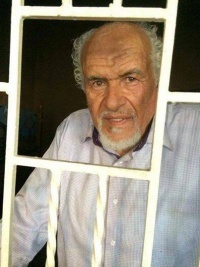Abduction of Suliman Awad Zubi
On 20 July 2014, 73-year-old Zubi was living with his family in Janzour, 12km west of Tripoli, when he was abducted by the Barag Al Nasser militia from Zintan, under the control of the Libyan armed forces. Among the various forms of humiliation that he suffered from the militia, Zubi was photographed and filmed in humiliating circumstances, hands tied to a machine gun. He was then tied to the back of a military vehicle which paraded through the streets of Zintan, before being taken to Ajmi prison in Zintan, operated by Amjad Al Ajmi Al Atri, the head of a Zintan militia.
Dangerous steps undertaken by Zubi's family to release him
Ever since his arrest, his relatives have been trying to get him released. Six months ago, they submitted a request to different authorities within the internationally recognised government in Tobruk. They also turned to different leaders from Zintan, but to no avail.
On 5 August 2014, his son, Bouseaf Suliman Zubi, who publicly accused General Haftar's militias for the abduction of his father, was executed in Benghazi a few days after his enforced disappearance in a neighbourhood of Benghazi controlled by militias belonging to Haftar's armed forces.
Following his brother's execution and fearing reprisals from the army, Bouseaf's brother, Dr Zakaria Zubi left Benghazi with his family and took refuge in Tripoli. There, he tried to get in touch with leaders of the Zintan militia in order to get hold of his father, but his request was denied. Instead, the militias' leaders requested a ransom of 10 million Libyan dinars (the equivalent of 6.5 million euro) for his father's release.
Dr Zakaria Zubi then turned to different official authorities of Tobruk, including members of the government and the president of the Parliament, given that they recognise the militias of Zintan as their own regular armed forces. During an official session of the Libyan Parliament, the cases of the retired judge and Member of Parliament (MP) and of other hostages abducted by militias were discussed, but when asked whether the hostages should be released, the majority of MPs voted against the motion, thereby endorsing the abduction and abduction of these victims.
Alkarama's action
Since none of the steps Suliman Awad Zubi's family undertook to get their relative released led to any concrete measure to investigate his unlawful arrest and detention, his relatives, seriously fearing for his life, contacted Alkarama.
Alkarama is greatly concerned over Zubi's fate, in particular in view of his old age and degrading health, and of the deplorable conditions of his detention including total lack of medical care, all of which represent grave violations of Libya's obligations under the Convention against Torture (CAT) to which the country is a party since May 1989. After over 10 months of arbitrary detention in solitary confinement, with just one meal a day and no care provided for his wounds – including a gunshot wound on the leg – his health is said to have significantly deteriorated.
Fearing for the victim's life as well as physical and moral integrity, Alkarama calls upon the UN WGAD to urge Libya to ensure that the former judge and MP be released immediately.
Furthermore, Alkarama submitted his case to the Prosecutor to the ICC and the Inter-Parliamentary Union.
The Libyan authorities' responsibility under international law
The Libyan authorities and militias must remember that not only governmental forces but also militias such as the Barag Al Nasser militia from Zintan can be prosecuted for war crimes. In fact, following the opening of an investigation into the situation in Libya by the Prosecutor of the International Criminal Court (ICC) on 3 March 2011 – following the adoption of Resolution 1970 referring the situation in Libya to the ICC – the adoption of Resolution 2174 on 27 August 2014 extended the ICC's jurisdiction to crimes committed by non-State groups.
Alkarama would like to remind the Libyan authorities that it is their primary responsibility to respect, protect and promote human rights and fundamental freedoms in their country under all circumstances, and urges them to put an end to the increasing breaches of international human rights law including in the form of unlawful arrests, arbitrary detentions and torture.
For more information or an interview, please contact the media team at This email address is being protected from spambots. You need JavaScript enabled to view it. (Dir: +41 22 734 1008)
 Algeria
Algeria Bahrain
Bahrain Djibouti
Djibouti Egypt
Egypt Iraq
Iraq Palestine/Israel
Palestine/Israel Jordan
Jordan Kuwait
Kuwait Lebanon
Lebanon Libya
Libya Mauritania
Mauritania Morocco
Morocco Oman
Oman Qatar
Qatar Saudi Arabia
Saudi Arabia Sudan
Sudan Syria
Syria Tunisia
Tunisia United Arab Emirates
United Arab Emirates Yemen
Yemen Other Countries
Other Countries







